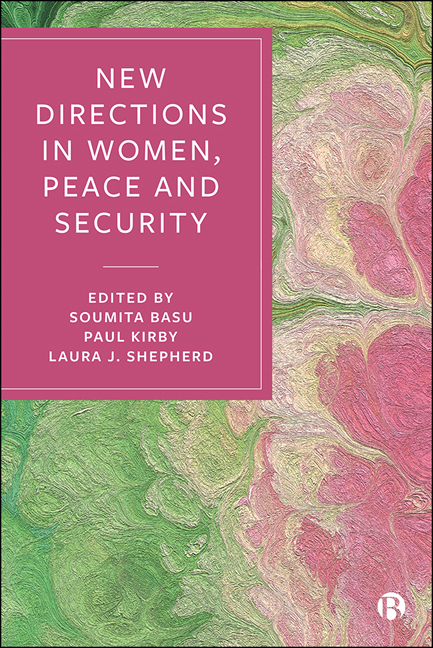8 - Holding Feminist Space
Published online by Cambridge University Press: 12 March 2021
Summary
Although each of us has engaged in a range of women, peace and security (WPS)-related work, our most immediate point of connection is that we each have acted as NGO policy advocates in the WPS policy space of the UN Security Council: sam cook, from 2005 to 2010 for the Women's International League for Peace and Freedom as the PeaceWomen Project Director and Louise Allen as the Executive Director Coordinator of the NGO Working Group on WPS from 2014– 2018. The contours of this policy space have shifted profoundly across the nine years of our combined experience – many of these changes are quite explicitly addressed by this volume. In this conversation we focus on the role of NGOs and some of the challenges of working in coalition in this particular space. The role of NGOs in policy formation (especially in relation to the adoption of UNSCR 1325) has been widely acknowledged, but the nature of ongoing engagement has received quite limited attention. As the body of WPS policy has expanded and developed, many feminist critiques of WPS policy have treated unsatisfactory policies as indicative of a failure in NGO representation. A common accusation is that those who occupy positions as NGO representatives in the policy space have been coopted or have abandoned their commitment to feminist principles (cook, 2018). Here we think through what NGO engagement involves, the risks of co-optation, and the challenges and rewards of working in feminist coalition.
sam cook (SC): The landscape of NGO policy advocacy we each faced is quite different. When I started at PeaceWomen in 2005, the Council had adopted one WPS resolution – UNSCR 1325. Our focus was on this one resolution, on expanding the Security Council's own understanding of peace and security and on getting it to pay attention to WPS issues in its day-to-day work. By 2015 there were eight resolutions and the membership of the NGO Working Group itself had radically expanded. What do you see as the role of NGOs, and more specifically of the Working Group, in relation to the Security Council's WPS policy?
- Type
- Chapter
- Information
- New Directions in Women, Peace and Security , pp. 123 - 130Publisher: Bristol University PressPrint publication year: 2020



